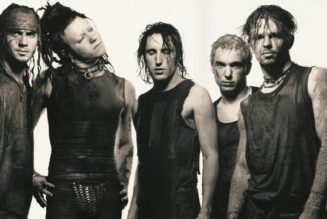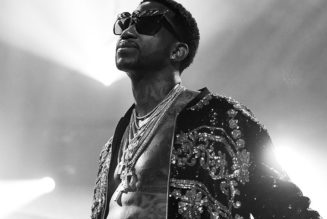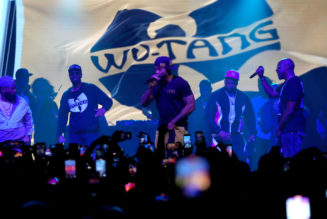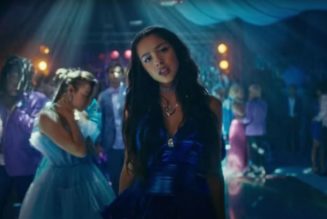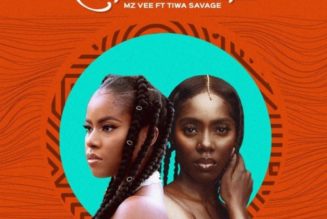Rushing from elementary school with handwritten raps in her pocket, 10-year-old Alyssa Michelle Stephens would hop in her father’s “old-school cars with [24-inch] rims” and head straight to the recording studio — first in his friends’ homes, but soon enough, in professional spaces. “When we started paying for sessions, he’d say, ‘You ain’t gon’ be in here all day,’ ” the artist now known as Latto recalls. “ ‘You better have that song ready, top to bottom, one take, in and out!’ ” Even then, the Atlanta-raised aspiring MC — today a chart-topping, Grammy-nominated rapper with more than 1 billion on-demand streams in the United States, according to Luminate — was preparing for her destiny, winning high school writing competitions as a fifth grader.
Nurtured by her accountant mother and “hustler” father — both of whom she recalls living off ramen noodles during her early years — the self-proclaimed “daddy’s girl” stayed ahead of the curve, accompanying him to video shoots where rising acts like Dem Franchize Boyz and Ciara used his cars. “I just remember being so mesmerized by the whole process,” she says. “I loved the fast-paced hustle and bustle.” At 16, Latto competed on (and won) the first season of Lifetime’s hip-hop reality show, The Rap Game, under the moniker Miss Mulatto. Already, she had the foresight to recognize a bad career move when she saw one and, citing a less-than-adequate payout, turned down the show’s grand prize — a record deal with Jermaine Dupri’s So So Def Recordings — and remained independent until she signed to RCA Records in 2020, following the success of her breakthrough single, “B–ch From Da Souf.”

Today, studio costs are no object to Latto, 24, who locks herself in the booth, pumping out 10 songs at a time about quarrels with her man or whatever inspires her on a given day. That tireless approach — Latto says she has hundreds of unreleased tracks stockpiled — has paid dividends, most notably with her massive 2021 hit, “Big Energy.” The song established Latto as a mainstream force — even if its mere existence was by no means a foregone conclusion.
“I heard my A&R and management whispering, debating on whether or not to play this beat for me,” Latto recalls. “It was just so different from everything else that I’ve done. They were hesitant on how I would react.” In the end, she loved the beat, despite not recognizing its biggest draw: a snippet of “Genius of Love,” the 1981 Tom Tom Club song famously sampled on Mariah Carey’s “Fantasy.”
“It ended up working in my favor,” she says. “I feel like that’s what kept it so ‘Latto.’ ” Still, the track’s eventual success surprised her. “I could feel the potential of the song and how commercial it was,” she continues, “but I definitely didn’t think it would be Grammy-nominated.”

For Latto, those wins paled in comparison to another “Big Energy” achievement: Carey herself called Latto’s management and chatted with the rapper for over an hour, leading to her appearance on the track’s March 2022 remix. “She was just embracing me and telling me she loves everything I’m doing,” Latto gushes. “It was a super out-of-body experience.”
Since “Big Energy” and Carey’s assist, Latto has positioned herself as rap’s biggest sweetheart. This year’s Powerhouse exudes warmth as she melts into her seat at Los Angeles’ Paramour Estate for her Billboard interview, flashing a bright white smile that contrasts with her painted-on, fire-engine red pantsuit. “You have to [ask yourself], ‘What am I going to sound like? What am I going to rap about? What will my beats sound like? Where’s my lane in the industry?’ ” she explains of her meticulously planned path. “Once you figure that out, you figure out the business side. Otherwise, you’re going to be high and dry when your 15 minutes are up.”
After breaking with “B–ch From Da Souf,” Latto diligently ensured her career would last. First, she changed her moniker from Mulatto to Latto, following controversy around the word’s connections to colorism. “New crib, new whip, new name/I’m still that b–ch,” she roared on her first single with RCA, “The Biggest,” adding on Instagram that the new name signified “a new chapter” and “good fortune, spiritually and financially.”
Her predictions came true, as “B–ch From Da Souf” became her first entry on the Billboard Hot 100 (peaking at No. 95) and both it and its follow-up, the Gucci Mane-featuring “Muwop,” went platinum. Her second album with RCA, 777, debuted at No. 15 on the Billboard 200, and within two years, she’d hit No. 3 on the Hot 100 with “Big Energy.”
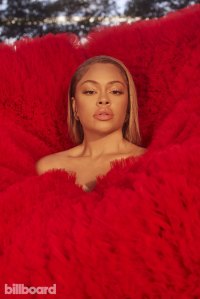
Since then, the rapper has received widespread support from women artists including Queen Latifah, Trina, City Girls, Cardi B, SZA, Remy Ma and Lizzo, who tapped Latto to support both North American legs of her Special arena tour. “I get a lot of love,” she says with an exuberant smile. “Real recognize real.”
And Latto intends to pay it forward, gushing over other newcomers like Flo Milli, Lola Brooke and GloRilla. “My No. 1 thing has been being a girl’s girl,” she explains. “I utilize my power in uplifting others on my way up. When you see Latto do a feature with an upcoming female rapper, I don’t charge them. The label got to cover the glam, but I don’t profit off that.”
Considering her youth, Latto has also displayed considerable foresight and grace thus far, which she attributes to the “get-it-out-the-mud” mentality she inherited from her teen parents. “[That’s why] I know what I want,” she adds.
Still, her cool under pressure has been tested. Last year, the rapper — like many her age, a fan of Nicki Minaj’s since childhood — became embroiled in a bitter Twitter battle with the rap legend, who had expressed frustration with the Recording Academy following its categorization of “Super Freaky Girl” as a pop song when considering it for the 2023 Grammys. “If [‘Super Freaky Girl’] has 2B moved out RAP then so does Big Energy!” Minaj wrote in a tweet that led to a blowout fight with Latto, who posted a recording of a phone call they’d had.
“It’s difficult navigating through situations like that because there’s a disconnect. I will look at myself as a fan of someone and they will view [me] in a whole different light,” Latto explains today. “It’s disappointing. You just got to take it to the chin and keep pushing.”

So when social media drama next reared its head — late last year, more than 100 of Latto’s unreleased songs were leaked without her knowledge, including tracks that would become massive hits for rappers Coi Leray and BIA — she responded with restraint, simply posting a trio of photos captioned “Trending.”
“I had to stop using my age as an excuse, because I [was] like, ‘I’m not nobody momma, I’m not nobody teacher. I’m not raising your kids.’ But unintentionally, you are,” she says now. “They look up to you. So I try to put my best foot forward.”
Now, she’s focused on a new “authentic” chapter in her career. “Because I started rapping so young, I’ve had a lot of other cooks in the kitchen,” she says. “So now I’m taking control back.” That means exploring new sounds, releasing her latest single, the pop-centric “Lottery,” while staying true to her hip-hop roots.
“The content I’m about to roll out is a whole fresh new leaf,” says Latto. “I genuinely love to see the new wave of female rap, and I’m honored to be a part of it.”

This story will appear in the Feb. 25, 2023, issue of Billboard.


